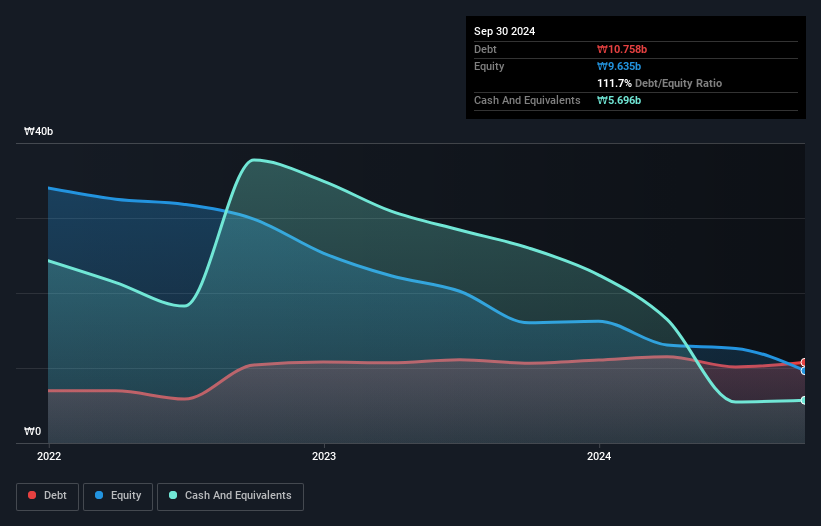
Howard Marks put it nicely when he said that, rather than worrying about share price volatility, 'The possibility of permanent loss is the risk I worry about... and every practical investor I know worries about.' So it seems the smart money knows that debt - which is usually involved in bankruptcies - is a very important factor, when you assess how risky a company is. Importantly, NGeneBio Co., Ltd. (KOSDAQ:354200) does carry debt. But is this debt a concern to shareholders?
When Is Debt Dangerous?
Generally speaking, debt only becomes a real problem when a company can't easily pay it off, either by raising capital or with its own cash flow. In the worst case scenario, a company can go bankrupt if it cannot pay its creditors. While that is not too common, we often do see indebted companies permanently diluting shareholders because lenders force them to raise capital at a distressed price. Of course, debt can be an important tool in businesses, particularly capital heavy businesses. The first thing to do when considering how much debt a business uses is to look at its cash and debt together.
See our latest analysis for NGeneBio
What Is NGeneBio's Debt?
The chart below, which you can click on for greater detail, shows that NGeneBio had ₩10.8b in debt in September 2024; about the same as the year before. On the flip side, it has ₩5.70b in cash leading to net debt of about ₩5.06b.

A Look At NGeneBio's Liabilities
We can see from the most recent balance sheet that NGeneBio had liabilities of ₩21.0b falling due within a year, and liabilities of ₩3.11b due beyond that. Offsetting this, it had ₩5.70b in cash and ₩3.60b in receivables that were due within 12 months. So its liabilities outweigh the sum of its cash and (near-term) receivables by ₩14.8b.
While this might seem like a lot, it is not so bad since NGeneBio has a market capitalization of ₩30.2b, and so it could probably strengthen its balance sheet by raising capital if it needed to. However, it is still worthwhile taking a close look at its ability to pay off debt. The balance sheet is clearly the area to focus on when you are analysing debt. But you can't view debt in total isolation; since NGeneBio will need earnings to service that debt. So if you're keen to discover more about its earnings, it might be worth checking out this graph of its long term earnings trend.
In the last year NGeneBio wasn't profitable at an EBIT level, but managed to grow its revenue by 38%, to ₩6.2b. With any luck the company will be able to grow its way to profitability.
Caveat Emptor
Even though NGeneBio managed to grow its top line quite deftly, the cold hard truth is that it is losing money on the EBIT line. Its EBIT loss was a whopping ₩15b. Considering that alongside the liabilities mentioned above does not give us much confidence that company should be using so much debt. Quite frankly we think the balance sheet is far from match-fit, although it could be improved with time. However, it doesn't help that it burned through ₩15b of cash over the last year. So in short it's a really risky stock. There's no doubt that we learn most about debt from the balance sheet. However, not all investment risk resides within the balance sheet - far from it. For example NGeneBio has 5 warning signs (and 2 which are significant) we think you should know about.
Of course, if you're the type of investor who prefers buying stocks without the burden of debt, then don't hesitate to discover our exclusive list of net cash growth stocks, today.
Valuation is complex, but we're here to simplify it.
Discover if NGeneBio might be undervalued or overvalued with our detailed analysis, featuring fair value estimates, potential risks, dividends, insider trades, and its financial condition.
Access Free AnalysisHave feedback on this article? Concerned about the content? Get in touch with us directly. Alternatively, email editorial-team (at) simplywallst.com.
This article by Simply Wall St is general in nature. We provide commentary based on historical data and analyst forecasts only using an unbiased methodology and our articles are not intended to be financial advice. It does not constitute a recommendation to buy or sell any stock, and does not take account of your objectives, or your financial situation. We aim to bring you long-term focused analysis driven by fundamental data. Note that our analysis may not factor in the latest price-sensitive company announcements or qualitative material. Simply Wall St has no position in any stocks mentioned.
About KOSDAQ:A354200
NGeneBio
Develops in vitro diagnostics companion diagnostics products and bioinformatics software.
Adequate balance sheet slight.
Market Insights
Community Narratives





